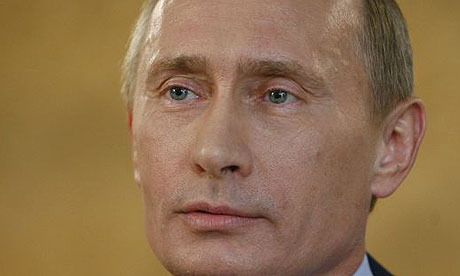Russian billionaire drops libel case against Economist
Magazine claimed Timchenko benefited from his close relationship with Russian prime minister Vladimir Putin
- guardian.co.uk, Thursday 30 July 2009 12.53 BST
-
 larger | smaller
larger | smaller - Article history

Vladimir Putin, the Russian prime minister. Photograph: Ria Novosti/Reuters
A secretive Russian billionaire has abandoned his libel case against the Economist magazine after it suggested he had benefited from his close relationship with Vladimir Putin, Russia's former president turned prime minister.
Gennady Timchenko said recently that while he and Putin knew one another, their relationship was one of casual acquaintanceship rather than friendship.
He agreed a settlement yesterday with the UK magazine in the high court in London.
Timchenko had hired the high-profile libel firm Schillings. Speaking in March, his aides said the oil tycoon was determined to go ahead with the case and had "nothing to hide".
According to the Russian newspaper Vedomosti, Timchenko's decision to sue in Britain could have forced him to reveal potentially embarrassing details of his private bank accounts and the ownership and asset structure of his Swiss-based oil trading company, Gunvor.
Asked why Putin's associate had chosen to embark on such a high-risk strategy, his London-based spokesman, Michael Prescott, told the Guardian in March: "We don't see it as a risky move. "We are determined to put an end to all the falsehoods. Gunvor and Gennady Timchenko ... have had enough of untrue stories appearing in spite of their best efforts to prevent this by simple and open dialogue."
Schillings issued a writ in January over the Economist article, published on 27 November 2008, called Grease my palm. It describes bribery and corruption under the Putin regime as "endemic", and points out that, according to Transparency International, Russia is one of the world's most corrupt countries, on a par with Kenya and Bangladesh.
The article, part of a Russia series, also mentioned Timchenko's alleged links with Putin. Timchenko is a highly reclusive billionaire oil trader who lives in Geneva, Switzerland. He appeared for the first time last year in the Forbes annual rich list, as the list's highest new entrant, with a fortune estimated at $2.5bn (£1.5bn).
The Economist said today: "Gunvor, Mr Gennady Timchenko and the Economist are pleased to announce they have settled the libel litigation brought by Gunvor and Mr Timchenko over an article published in last November's Economist." An agreed text will be published in tomorrow's issue.
Timchenko co-founded Gunvor more than 10 years ago. The company is the world's third-largest oil trader and exports about a third of Russia's seaborne oil. Timchenko has denied accusations that Gunvor had won favourable contracts with Russia's state-oil companies because of his alleged friendship with Putin.
In December 2007, the Russian political scientist Stanislav Belkovsky told the Guardian Putin had secretly amassed a $40bn fortune. Putin was the beneficial owner of "75% of Gunvor", he claimed, adding that Putin's ownership was concealed through a "non-transparent network of offshore companies". Putin denied the claim three months later.
In a letter to the Guardian in December 2007, Gunvor's chief executive, Törbjorn Törnqvist, said Putin "was not a beneficiary of its activities". However, he confirmed for the first time the men had been friends since the 1990s. "Timchenko did indeed know President Putin in the days before the latter became famous," Törnqvist wrote. "However, suggestions that they share a KGB heritage or have been in business together are completely wide of the mark."
Last year the Guardian sent Timchenko a list of questions asking him to elaborate on the precise nature of his relationship with Putin, and seeking more details as to how and where they first met. Timchenko declined to answer. The billionaire has so far given only one media interview, to the Wall Street Journal last year.
It is not clear why Timchenko sued the Economist, rather than write a letter of complaint. The Economist article contains two controversial paragraphs, and appears to repeat claims made by the Financial Times last May.
In a letter last year to the FT, Timchenko said he had sponsored a judo club in St Petersburg that had Putin as its honorary president. He denied this meant he was "close" to the Russian leader.
The Economist's Moscow correspondent, Arkady Ostrovsky, was unavailable for comment today .
Sources familiar with the case suggest the Kremlin may have decided to punish the Economist for its consistently critical reporting on Russia, especially on taboo themes that irritate the Moscow administration, such as the country's security services.

No comments:
Post a Comment